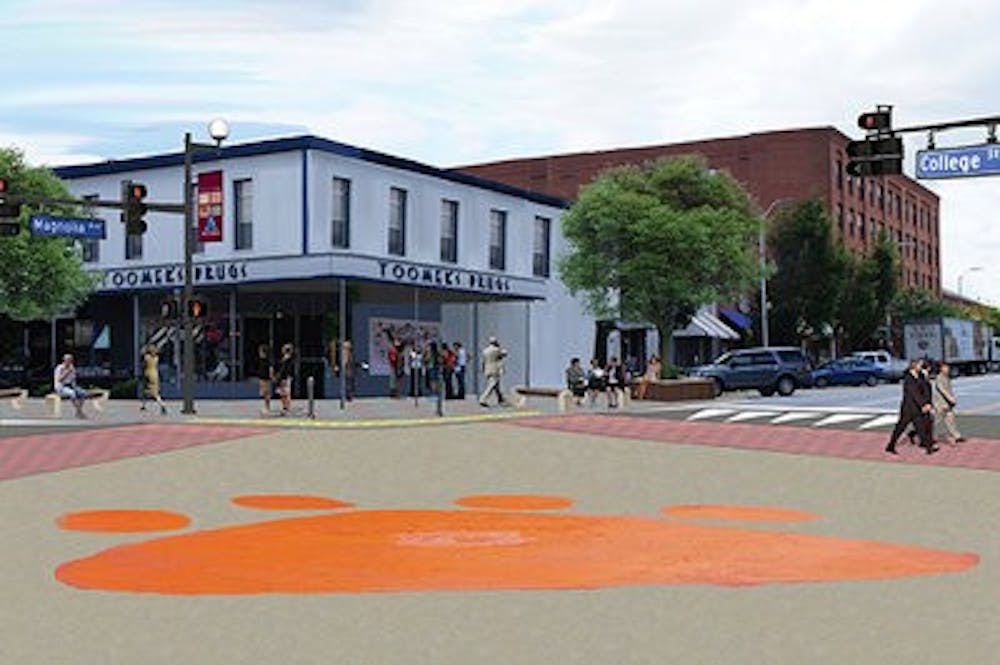Auburn University and the City of Auburn recently announced they will receive consultations from the Urban Sustainability Accelerator (USA) program at Portland State University over the next year.
USA, housed in the School of Urban Studies and Planning, offers year-long services to smaller and midsized communities called cohorts, throughout the United States, according to Robert Liberty, executive director of USA.
These services provide consultations to help implement sustainability and redevelopment projects in interested cities.
In Auburn, three main projects will receive consultations: downtown's section of College Street, stormwater infrastructure and the alleys and back lots downtown.
Kevin Cowper, assistant city manager of Auburn, said calming the wide stretches of College Street between intersections downtown is a top priority for the city.
Similar to how the crosswalks on Magnolia Avenue funnel pedestrians off campus, the city wants to build crosswalks across College Street and between Samford Avenue and Roosevelt Drive.
The recent development and popularity of the Heart of Dixie shopping center and adjacent Barbecue House have caused an increase in students and faculty jaywalking across College Street, resulting in the need for a crosswalk.
The city also plans to redevelop the intersection of Toomer's Corner to match the changes being made to the University's corner of College Street and Magnolia Avenue. The project is scheduled to start in the summer of 2015.
Cowper said a landscaped median is planned between Samford and Thach Avenue to make "a more aesthetically pleasing entrance to campus and downtown."
Projects increasing the stormwater infrastructure on and off campus will also receive consultations.
Recent improvements to Parkerson Mill Creek, near the Wellness Kitchen, showcase how the University wants to increase flood protection and water quality on campus, according to Liberty.
Liberty said he hopes the plans to allow rainwater and run-off to soak into the ground will create long-term solutions to growing flooding concerns and will help replenish Auburn's water table, the underground surface saturated with water.
Another project involves cleaning up the alleys and back lots behind Little Italy and Moe's Barbecue on Magnolia Avenue.
The project, scheduled to start in December, will allow Auburn to grow up, not out, according to Liberty.
Building on the existing structures and space will better use Auburn's developed downtown and will increase the area's attractiveness.
Liberty said he also wants to rethink the way Tiger Transits are used. He thinks using the transits for more off-campus trips, similar to how the transit currently runs to Wal-Mart and Tiger Town, could better benefit more faculty, staff and students.
Mike Kensler, director of campus sustainability operations, said these projects should make Auburn a more pedestrian-friendly campus and create a greater "sense of place" where students can congregate at places, such as Toomer's Corner.
Liberty said USA researched between 40 and 50 towns and talked to more than 200 people before settling on this year's cohorts.
Each college and town cohort is required to give $18,000 to USA, which will cover 20 percent of the cost of consultations.
The remainder of USA's funding comes from three sources this year: the Summit Foundation in Washington, D.C., the Entity for Sustainable Solutions at Pennsylvania State University and an independent grant from the California Strategic Growth Council.
The program also receives monetary gifts and volunteered consultation services.
Kensler said a group of seven people from Auburn will go to Portland, Oregon, in mid-July to meet with the consultants.
After their consultation, the group, consisting of three University employees and four city employees, will revise their plans.
Liberty, who visited Auburn this spring, said he enjoyed touring Auburn, despite the heat, because of the hospitality and interest in USA he saw.
"It's a pleasure working with Southerners because of their graciousness," Liberty said.
Kenser said he is looking forward to the city and University's collaboration with USA.
"This gives us another opportunity to enhance that relationship and work together to create outcomes that are really going to be enjoyable and visible by the people of the Auburn community," Kensler said.
Do you like this story? The Plainsman doesn't accept money from tuition or student fees, and we don't charge a subscription fee. But you can donate to support The Plainsman.





